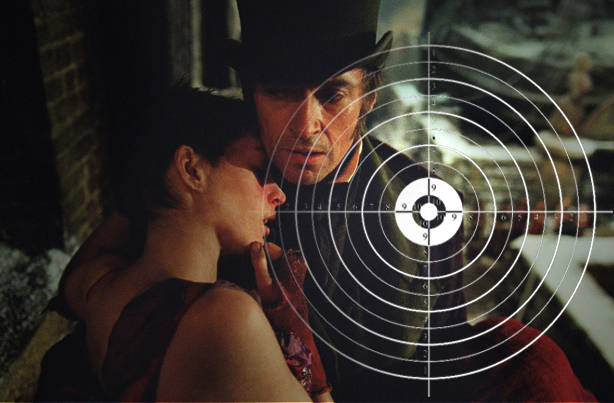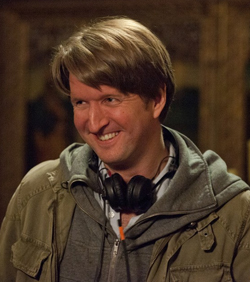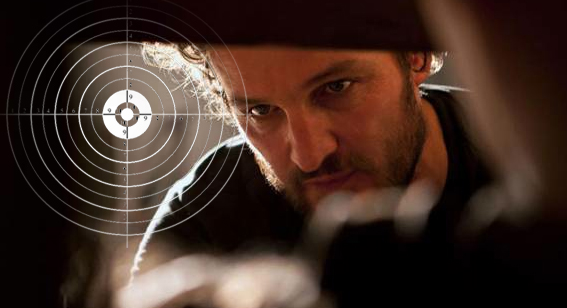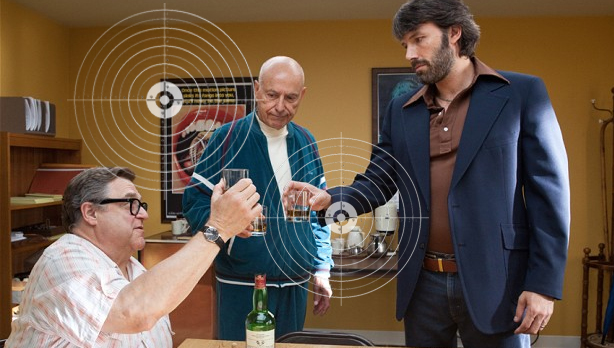Does a movie have to be perfect to be deemed a masterpiece or a grand success? That's a rhetorical question of course since the answer is no. What's perfect after all? Sometimes mistakes and flaws in judgement (which are, of course, in the eye of the beholder) can make a movie more organic and lively than something that is technically irreproachable.
Encore Entertainment was recently ranting about the weird and unfortunate trend of people rooting for movies to fail... in many cases even before they've seen them. It's a weird truth about Oscar season and I'll admit right here and now before we begin that I've also been guilty on occasion. It's how I've been feeling about The Hobbit: An Unexpected Journey from the moment I heard they were splitting one book into three movies. It rubbed against all of my core beliefs about what's wrong with Hollywood and their willingness to sacrifice good storytelling and goodwill to shake down eager fans for every last penny.

It's easiest to spot this kneejerk HAHA YOU SUCK mentality in the ongoing attacks on Les Misérables around the internet and the almost sadistic joy you could feel rippling out when it debuted to unexpectedly harsh reviews. More...
Les Miz will continue to be this year's easiest target, partially because it's an epic (the larger the target...), partially because it's earnest without any of the protective critical armor of intellectualism or auteurism, and partially because it's a musical. This last point is the exasperating one. Musicals, more than any other genre, are subject to mobs and their torches. A truth: a musical's individual qualities don't matter to many viewers who loathe musicals on principal. A second less forgivable truth: a musical's individual qualities don't even matter to a certain subset of critics, opinion-makers and pundits since it's arguably the only film genre that one isn't required to approach with respect or even understanding of how its internal rules operate when reviewing it. Imagine the beating critics would take online if they didn't know anything about the horror genre and ripped into a new horror film that aficionados were fond of. (This skewed ignorance is acceptable in criticism point became evidently clear to me while reading reviews that took issue with Sweeney Todd's "weak" and "tuneless" score. Argh! If you think Sondheim's masterpiece is a lousy one you know next to nothing about musical theater and have confused the source material's greatness with the weakness of non-musically trained voices and direction).
 Is Tom Hooper a good director? He hasn't changed his approach much for his third feature but people didn't mind last time to the tune of an Oscar winI've seen Les Miz one and ½ times now (blame a faulty screener for the ½), and I stand by my initial excitement. I've yet to write a review which tends to be the last step in solidifying my opinion so perhaps my enthusiasm will wane. But, wax or wane, the movie is special, particularly in its first half since Anne Hathaway and Hugh Jackman are insanely committed to high-wire work in roles they seem born to play. But, yes, yes, the film has flaws. Chief among them is Russell Crowe who is unfortunately blank in the crucial role of Javert -- as if he was nervous to make bold choices with the character, unable to act while singing, or as if he mistook minimalism for nuance. I wish, along with the haters of the film, that Tom Hooper had a few more visual ideas up his sleeve. His team (art direction, costumes, editing, etcetera) is doing fine work but you wouldn't always know it from his "All Close-Ups! All the Time!" aesthetic. His choice to shoot the key solos in long largely unbroken close-ups is absolutely thrilling -- no moreso than in Hugh Jackman's "Soliloquy" and Anne Hathaway's "I Dreamed a Dream" both of which blow the roof off -- but nobody would gripe about this style if Hooper and his cinematographer Danny Cohen had the visual imagination to vary their technique in the building block scenes between these big payoffs and especially if they understand that it's not the best approach for duets and choruses. I was personally most frustrated by this visual limitation during the Cosette/Eponine/Marius medley. Love triangles work best when the viewer can see the geometry in play. A series of closeups of three beautiful actors just isn't going to cut it when the whole point of the scene is not their own journey but their journey in relationship to one another.
Is Tom Hooper a good director? He hasn't changed his approach much for his third feature but people didn't mind last time to the tune of an Oscar winI've seen Les Miz one and ½ times now (blame a faulty screener for the ½), and I stand by my initial excitement. I've yet to write a review which tends to be the last step in solidifying my opinion so perhaps my enthusiasm will wane. But, wax or wane, the movie is special, particularly in its first half since Anne Hathaway and Hugh Jackman are insanely committed to high-wire work in roles they seem born to play. But, yes, yes, the film has flaws. Chief among them is Russell Crowe who is unfortunately blank in the crucial role of Javert -- as if he was nervous to make bold choices with the character, unable to act while singing, or as if he mistook minimalism for nuance. I wish, along with the haters of the film, that Tom Hooper had a few more visual ideas up his sleeve. His team (art direction, costumes, editing, etcetera) is doing fine work but you wouldn't always know it from his "All Close-Ups! All the Time!" aesthetic. His choice to shoot the key solos in long largely unbroken close-ups is absolutely thrilling -- no moreso than in Hugh Jackman's "Soliloquy" and Anne Hathaway's "I Dreamed a Dream" both of which blow the roof off -- but nobody would gripe about this style if Hooper and his cinematographer Danny Cohen had the visual imagination to vary their technique in the building block scenes between these big payoffs and especially if they understand that it's not the best approach for duets and choruses. I was personally most frustrated by this visual limitation during the Cosette/Eponine/Marius medley. Love triangles work best when the viewer can see the geometry in play. A series of closeups of three beautiful actors just isn't going to cut it when the whole point of the scene is not their own journey but their journey in relationship to one another.
But I'm willing to forgive if not endorse Tom Hooper for this frustrating lapse in visual judgment because I understand that this is a very real flaw in about 92% of the movies made nowadays. Blame your beloved iPhones and TVs for modern Hollywood's weird insistence that all movies be shot in such a way that they're easy to understand when reduced to tiny squares. I keep hoping that this trend will turn around now that home screens are regularly quite large but we're still on the downward spiral from decades of pan & scan and TV dominance. I kept hoping that once TV started getting more cinematic (see Mad Men and other acclaimed visual treats) that the cinema would stop trying to get televised but so far that tipping point hasn't come.
All that said, Les Miz is hardly the only Oscar Goliath with flaws. Let's look quickly at the four other presumed frontrunners. You know which films those are...
ZERO DARK THIRTY
This week the media has been buzzing about the "glorifies torture!" charge that's been launched against the movie in pieces from The New Yorker to . Naturally, the film's legion of rabid fans have rushed, foaming at the mouth, to its defense. But the fannish absolutism of the defenders sometimes reduces the argument in the film's favor to a shrill "NO IT DOES NOT!" suggesting, at least to me, that the film is too new and people are too besotted with it to have really worked through it.

Kathryn Bigelow and her team are completely not shy about presenting deeply uncomfortable images and morally confusing messages but Zero Dark Thirty's fans are reluctant to receive them as such. I go back and forth on the charge myself. I think it's ludicrous to suggest that the film can't be read as pro-torture since the film does infer that these torture sessions during the films first act help Maya (Jessica Chastain) develop her (correct) theories. It seems that short of a line of dialogue saying "wow, we would have never figured this out without torture!" the film's most passionate fans would refute the charge.
Moral quandaries aside, the film has a pretty glaring unrelated flaw that you don't hear people talking about. Kathryn Bigelow is a terrific choreographer as directors go and she's always had a gift for suspense but in one key scene involving a CIA agent played by Jennifer Ehle, Bigelow telegraphs an impending disaster so far ahead of time that the scene loses its bite and starts to feel like a sadistic countdown for a lame red herring rather than a gripping 'where is this going?' piece of the puzzle it's previously been presented as.
LINCOLN
Tony Kushner's screenplay, adapted in part from two chapters of "Team of Rivals: The Political Genius of Abraham Lincoln", is so vivid and entertaining for large chunks and so shockingly special within the usually mundane realm of people-standing-around-in-rooms-arguing drama, that it's easy to brush off the weaker aspects of the film by forgetting them outright: the beginning battlefield sequence never once feels genuine but like a theatrical prologue of noble intent with characters entirely free of character (and period) who are just standing around to impart "Message!" and signify "The Future!". That's also true of Gloria Reuben's entire character which is a shame because in the realm of politics the film is never shorn of complexity. Another quibble: the ending is weirdly insistent on having it all ways about the Lincoln assassination and it doesn't feel tonally connected to the rest of the movie.
I was recently talking to a frequent moviegoer with fairly high-end taste at a party that had nothing to do with the movies. Her favorite this year is Beasts of the Southern Wild and she was quite insistent that Lincoln was "boring!" and "the most boring" of the Oscar contenders. I heard the same from a member of AMPAS Acting branch recently at a different party with the additional gripe that Spielberg should have edited out at least 20 minutes of the thing. Both times I was surprised. I am generally less forgiving than many critics of movies that sail on past the two hour mark without thinking of the demands they're making on one's ass and patience, but I was never bored by Lincoln. But, again, flaws are in the eye of the beholder.

ARGO
Ben Affleck's third film, a giant leap forward in his journey to become Clint Eastwood 2.0, has had a weird month. Back in late October it seemed that everyone was in love with it but the bloom went off the rose and suddenly around the internet there was a groundswell of "Argo sucks". Backlash is a common occurence for Oscar frontrunners so it's not entirely surprising but the tide seemed to turn quickly. This started, I think, with the first screenings of Zero Dark Thirty which many pundits like to see as a total equivalency given that both films are Middle East and US Government related. In some ways though it's a false equivalency. Like many critics I also prefer Zero Dark Thirty but in point of fact it's not better at everything than Argo is because THEY ARE TRYING TO DO VERY DIFFERENT THINGS: Argo is a joking rescue adventure about an altruistic hero in the 1970s who risks his life to save his countrymen who are trapped in the Middle East and it also happens to be an ode to the power of make-believe and the movies; Zero Dark Thirty is a stone-faced mystery about a heroine who gives the whole of herself to avenge her countrymen who are trapped psychologically in the Middle East and it also happens to be a riveting procedural about "certainty" in a world where nothing is certain, least of all your own heroism (and we're back to the torture controvery again).
In short, it's stupid to attack Argo because you like Zero Dark Thirty. But have at it if you find fault with its excessive dramatic cliches, not entirely ungeneric "thriller" filmmaking, or its weird fudging of facts for drama (why fudge facts when the story is super dramatic already?). Also, I remain mystified that people like the score, which is one of Alexandre Desplat's weakest efforts to date. His score for Zero Dark Thirty is much bet--- ARGH, HERE WE GO AGAIN.
SILVER LININGS PLAYBOOK
I can't even talk about this movie which I think is the worst film David O. Russell has ever made and is being received like it's his unqualified best. WHY does everyone love it? I found it shrill, chaotic, reductive, absurd, and sexist... though it did have some good laughs. And, Bradley Cooper's surprisingly strong performance aside, it's free of genuine-feeling characterizations and characters though there's star charisma and "characters" to spare...
Whew. It was good to get all of that out of my system. Generally speaking I love the movies. Even the ones I gripe about. But I'm feeling a touch sensitive about the tomatoes being thrown at my beloved Les Miz. No film is perfect. Shut out the haters and the always terrible character trait of wishing for others to fail and try to enjoy every movie you see, warts and all. Movies are way more fun to love than hate. Wait for the Oscar nominations to arrive on January 10th, and THEN start bitching about the movies that are overappreciated according to you. But give them a fighting chance to find their fans first so someone can argue back at you about their merits.